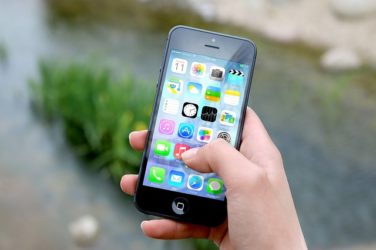Why I own an iPhone
By Zane Patalive, www.realitcare.com

Most Secure Cell Phone – Tomato, Tomahto…
“You say ‘Tomato’, I say ‘Tomahto’”. This famous line was first uttered in the 1936 Mark Sandrich movie Shall We Dance staring Fred Astaire and Ginger Rogers in their duet “Let’s Call the Whole Thing Off.” Today we may hear this phrase spoken at the conclusion of a discussion with differing viewpoints. My reason for today’s article is to present my viewpoint on why the Apple iPhone is the superior choice of “most secure cell phone” when compared with Google’s Andriod phones.
When purchasing a smartphone, there are generally only 2 technologies to choose between, an Android (Google) or an Apple; droid or iPhone, Tomato or Tomahto… To be fair, Microsoft’s Windows 10 Mobile is an excellent platform, but due to their current lack of market share, this discussion will only consider the choice between Apple’s iPhone and Google’s Android phones.
To begin our comparison, we have to agree that the feature set of both platforms is nearly identical. Both support a powerful handheld computer that runs Web-connected applications, takes breathtaking pictures, and even doubles as a telephone. These similarities end when we peal back the layers and examine the DNA of both product families. Android built their technology on open source, providing their technology to many manufacturers to tweak and customize for their individual devices and purposes. As such there are a plethora of Droid devices hailing from numerous manufacturers, giving consumers a rich eco-system of custom fit products. In comparison, Apple has a closed and extremely protected development model that allows for only 1 provider of their technology: them. To fully discuss the advantages and disadvantages of each technological platform, I would need to write volumes, but for the sake of this discussion, I will only focus on one aspect, and that is security and the most secure cell phone.
There’s Gold in Them Thar Hills
It has been described that the current state of the Internet, and the Internet of Things, is similar to the wild west of 1849. Unfortunately, this time around, the gold rush is the pursuit of stealing personal information and cash from the unsuspecting populace (see my previous article on preventive measures of cyber crime for more on this). This nefarious activity is performed by hackers who leverage programming errors in the software that controls our computers and even some of the most secure cell phones, allowing them access to our private information. To protect us and to secure their products, the manufactures release patches or updates to their software as vulnerabilities are discovered. This is why it is so critical to keep all of our PCs, phones, and tablets updated on a monthly basis. Android’s current update process is arguably broken, leaving millions of users vulnerable.
Since Android is open source software that is provided to licensed manufacturers for customization, Google cannot offer a single patch to uniformly update all Android devices. Instead, Google first sends the software fix to the chipset manufacturers. They verify compatibility and may or may not write updated drivers. They would then send their update to the phone manufacturer who works with the cellular companies and Google to eventually publish an update via Google Play. This process is slow and dependent upon numerous companies working together to create a final patch that is customized for each individual Droid device in the market. Reference this site to see how HTC streamlines this process (but it is still confusing!) http://www.droid-life.com/2013/12/26/awesome-infographic-htc-shows-us-the-anatomy-of-an-android-os-update-from-pdk-to-ota/
Apple’s updating process is light years ahead of Google’s. Since Apple is the sole manufacturer of the hardware and software for the iPhone, and since they don’t allow the cellular carriers to tweak their phones, every iPhone communicates directly back to Apple’s own servers to receive an operating system update. As such, updates are released nearly immediately when needed and available to all iPhones running the latest version of Apple’s Operating System, iOS.
Beyond Apple’s advantage with updating their products, Apple’s App Store is heavily protected and only allows certified apps to be published. Every app that is submitted by developers is tested by Apple’s App Review Team to ensure they are ‘reliable, perform as expected, and are free of offensive material.” Apple has been extensively criticized for this ‘censorship’, but as a security-conscious consumer, I couldn’t be happier about it and is a big reason I see the iPhone as the most secure cell phone. Whenever I download an app from Apple’s App Store I know for certain that the app has been verified to perform as advertised and will not steal information that it isn’t supposed to access. Historically this has not been the case with Google Play. Android users had to exercise a ‘buyer beware’ caution of app selection as there was no way to verify that the solitaire app just installed won’t steal your online banking credentials and send this data overseas. Google has recognized this critical flaw and in the summer of 2015 finally implemented a review process similar to Apple’s; too little, too late for me.
There are other reasons why I have chosen to use the iPhone, but in our current day and age, being the most secure cell phone has got to be the trump card every time. Some say ‘Tomato’, others say ‘Tomahto’, but to see Fred and Ginger give an impressive display of tap dancing on roller skates, check out this link http://greatamericansongbook.net/pages/songs/l/lets_call_whole_thing_off2_f.html

